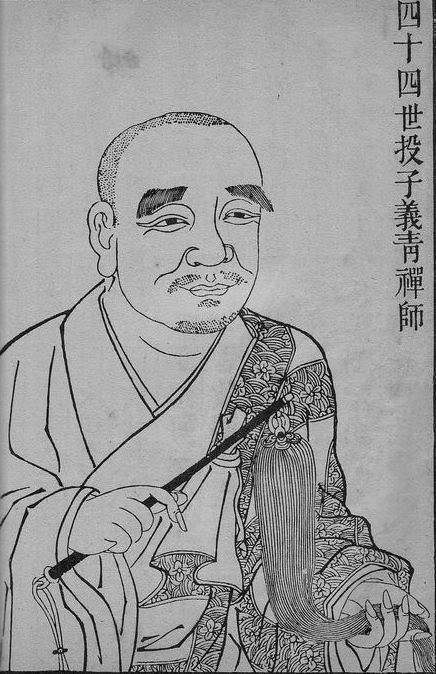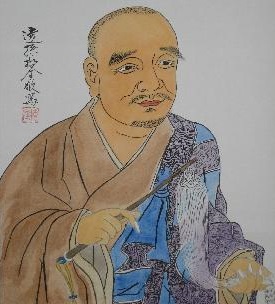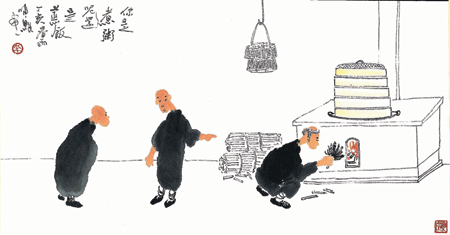ZEN IRODALOM ZEN LITERATURE
« Zen főoldal
« vissza a Terebess Online nyitólapjára

投子義青 Touzi Yiqing (1032-1083)
(a.k.a. 投子青華嚴 Touzi Qing Huayan)
(Rōmaji:) Tōsu Gisei
Tartalom |
Contents |
| Tou-ce Ji-csing mondásaiból Fordította: Terebess Gábor |
Touzi Yiqing Empty Valley Collection (空谷集) |
四十四世投子義青禪師 (1032-1083)
Patriarchs of the Forty-fourth Generation: Dhyana Master Yi Qing (Righteous Green) of Touzi
【 佛祖道影白話解 】 Lives of the Patriarchs
虛雲老和尚編輯 Composed by the Elder Master Hsu Yun (虚云 Xuyun, 1840-1959)
宣化上人講 Commentary by the Venerable Master Hsuan Hua (宣化 Xuanhua, 1918-1995)
宣公上人講於一九八四年五月卅一日 Lectured by the Venerable Master on May 31, 1984
國際譯經學院記錄翻譯 Translated by the International Translation Institute
in: 金剛菩提海 Vajra Bodhi Sea (VBS): A Monthly Journal of Orthodox Buddhism, June & July 2005
http://www.drbachinese.org/vbs/publish/421/vbs421p012.htm > http://www.drbachinese.org/vbs/publish/421/vbs421p012.pdf
http://www.drbachinese.org/vbs/publish/422/vbs422p012.htm > http://www.drbachinese.org/vbs/publish/422/vbs422p012.pdf

Touzi Yiqing
by Andy Ferguson
In: Zen's Chinese Heritage: The Masters and Their Teachings, Wisdom Publications, 2011, pp. 389-392.
TOUZI YIQING (1032–83) was the Caodong Zen school Dharma heir, but not the direct student, of Dayang Jingxuan. He came from ancient Qingshe (near the modern city of Yanshi in Henan Province). According to the Wudeng Huiyuan, he left lay life at the age of seven to live at Miaoxiang Temple. Initially, he studied the “hundred dharmas doctrine” of the Consciousness-Only school of Buddhism. One day he said, “(This doctrine) is obscure and extensive. Of what advantage is all of this difficulty?” Later he undertook the practices of the Huayan school, but upon reading the words “Mind is self-nature,” he had an insight, saying, “Dharma is not found in the written word, and how can one speak of it?” He then went traveling to find and study under a Zen teacher.
*
At that time, Zen master Yuanjian [Fushan Fayuan] was staying at Sacred Peak. One night he saw a blue eagle in a dream and took it as an omen. The next morning, Touzi arrived and Yuanjian received him ceremoniously.
Now, because a non-Buddhist once asked the Buddha, “I don’t ask about that which may be spoken of, and I don’t ask about what may not be spoken of…,“ after three years Yuanjian asked Touzi, “Let’s see if you remember your huatou.”
Touzi began to answer when Yuanjian suddenly covered Touzi’s mouth with his hand. Touzi then experienced enlightenment. He bowed.
Yuanjian said, “Have you awakened to the mysterious function?”
Touzi said, “Were it like that I’d have to spit it out.”
At that time an attendant standing to one side said, “Today Qing Huayan [Touzi] is sweating as if he were ill!”
Touzi turned to him and said, “Don’t speak insolently! If you do so again I’ll vomit!”
After three more years, Yuanjian revealed to Touzi the essential doctrine passed down from Dongshan and Touzi grasped it entirely. Yuanjian presented Touzi with Dayang’s portrait, sandals, and robe. He then instructed him to “carry on the method of this school in my behalf, so that it will not end here. Well and befittingly sustain and preserve it.”
Yuanjian then wrote a verse and presented it to Touzi.
Mt. Sumeru stands in the great void.
It supports the spinning sun and moon.
Upon it countless peaks do rest,
The white clouds there transformed.The Shaolin wind sows a forest.
The Caodong screen rolled up.
A golden phoenix lives in a dragon’s nest.
Imperial moss is crushed by a wagon.*
Zen master Fayuan sent Touzi to study with Zen master Yuantong Shen. But when Touzi arrived at Yuantong’s place, rather than going for an interview with that teacher at the appointed time, he remained sleeping in the monk’s hall.
The head monk reported this to Yuantong, saying, “There is a monk who’s sleeping in the hall during the day. I’ll go deal with it according to the rules.”
Yuantong asked, “Who is it?”
The head monk said, “The monk Qing.”
Yuantong said, “Leave it be. I’ll go find out about it.”
Yuantong then took his staff and went into the monk’s hall. There he found Touzi in a deep sleep. Hitting the sleeping platform with his staff, he scolded him, “I don’t offer any ‘leisure rice’ here for monks so that they can go to sleep.”
Touzi woke up and asked, “How would the master prefer that I practice?”
Yuantong said, “Why don’t you try practicing Zen?”
Touzi said, “Fancy food doesn’t interest someone who’s sated.”
Yuantong said, “But I don’t think you’ve gotten there yet.”
Touzi said, “What point would there be in waiting until you believed it?”
Yuantong said, “Who have you been studying with?”
Touzi said, “Fushan.”
Yuantong said, “No wonder you’re so obstinate!”
They then held each other’s hands, laughed, and went to talk in Yuantong’s room.
From this incident Touzi’s reputation spread widely.
*
Touzi first taught on White Cloud Temple in Jianzhou. He later moved to the Shengyin Monastery in Shuzhou (located on Mt. Qian in Anwei Province).
*
Zen master Touzi Yiqing entered the hall and addressed the monks, saying, “To speak of this affair is like a phoenix soaring into the heavens, not leaving a trace behind. It’s like a ram whose horns are entangled in a tree [and thus does not touch the ground]. Where will you find any tracks? A golden dragon is not concealed in a cold swamp. A jade rabbit nests in the moonlight. In order to establish the guest and host, you must stick your head out beyond the noisy world. If you answer my questions properly, you’re singing at the edge of the mysterious road. But in that case, you’re still only halfway there. If you’re still staring in miscomprehension, don’t belabor what you see!” Zen master Touzi Yiqing entered the hall and addressed the monks, saying, “Don’t stop in a run-down shack in an isolated village. Go through the mountain pass of the buddhas and ancestors. You are all like Su Taichu, always hitting barriers, never finding your way home. You’re like Lord Xiang when he reached the Niao River. Where can you escape your tortured life? All Zen worthies who have reached this state—if they go forward, they fall into the hands of the celestial demons. If they retreat, they slip into the way of the hungry ghosts. If they go neither forward nor backward, then they drown in the dead water. All of you! Where will you find peace?”
After a pause, Touzi said, “Even three feet of snow can’t crush a one-inch spiritual pine.”
*
When Touzi was near death, he composed a poem:
As the abbot of two temples,
I couldn’t assist the Buddha way.
My parting message to you all,
Don’t go seeking after something.Touzi then put down the brush and passed away.
*
Upon his death, Touzi received the posthumous name “Zen Master Complete Compassion.”
Tou-ce Ji-csing mondásaiból
Fordította: Terebess Gábor
Illusztrációk: 李蕭錕 Li Xiaokun (1949-)

李蕭錕 Li Xiaokun (1949-) illusztrációjaKaj [Fu-zsung Tao-kaj, 1043-1118] szakácsként szolgált Tou-ce kolostorában.
– Nem könnyű szakácsnak lenni – szólította meg egy nap Tou-ce.
– Milyen jó vagy hozzám!
– Az a dolgod, hogy nyákot és rizst főzzél?
– Hát az egyik segítő megmossa a rizst és megrakja a tüzet, a másik pedig megfőzi a nyákot és a rizst.
– És te mit csinálsz?
– Jóságod folytán semmi dolgom sincs, csak lebzselek egész nap.
李蕭錕 Li Xiaokun (1949-) illusztrációja
Buddhával tüzelni
A kietlen völgy gyűjteménye 25.Egy dermesztően hideg nap Tan-hszia mester megszállt egy útszéli templomban. Fogott egy Buddha-szobrot a szentélyből és befűtött vele. A templom apátja olyan haragra gyulladt, hogy kihullt a szemöldöke.
Tou-ce felidézte a történteket, majd megjegyezte:
— Ha a vendég nem tud viselkedni, a gazda járja meg.Tan-hszia Tien-zsan (739-824) > 丹霞天然 Danxia Tianran > [Rōmaji: Tanka Tennen]